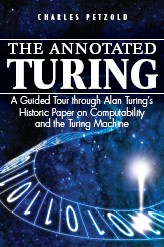Reading Casti’s “The Cambridge Quintet”
May 12, 2008
Roscoe, N.Y.
A friend mentioned John L. Casti's The Cambridge Quintet: A Work of Scientific Speculation (Perseus Books, 1998) to me recently because Alan Turing plays a major role in this fictional dialogue concerning machine intelligence.
The premise is this: In 1949, C.P. Snow wants to advise the British government on the possibilities and potentials of machine intelligence, so he hosts a dinner party at his home in Cambridge with four guests to discuss the issues: Turing, philosopher Ludwig Wittgenstein, geneticist J. B. S. Haldane, and physicist Edwin Schrödinger. Over seven chapters corresponding to the courses of the dinner (sherry, soup, fish, meat, salad, dessert, and cigars and brandy), Casti narrates this imagined conversation. The result is an entertaining introduction to some of the philosophical concepts associated with artificial intelligence and human consciousness.
The philosophical dialogue is a time-honored genre, although traditionally it's populated by character types (such as in the dialogues of Cicero, Galileo, and Hume) rather than actual historical personages. The personalities definitely make The Cambridge Quintet more compelling than it would have been otherwise. We get to see the rumpled Turing often excitedly stuttering when describing his research and ideas, and Wittgenstein already suffering from the cancer that will kill him but taking the stage to deliver his profound pronouncements.
The debate is primarily between Turing and Wittgenstein, with Snow playing the moderator. It's not always clear why Casti specifically brought Schrödinger and Haldane into the fray — although Schrödinger sometimes introduces a Eastern religious perspective, and Haldane bemoans the Lysenko travesty in the U.S.S.R.
Casti warns us in the Author's Note that he incorporates ideas that arose much later than 1949, and it is indeed startling to hear Wittgenstein adopt a lightly altered version of John Searle's famous Chinese Room argument, and for Turing to describe ideas normally attributed to Noam Chomsky: "Suppose," Casti's Turing says "there is a structure in our brains given to us by evolution that is specialized just for language, a kind of language 'organ", if you like." (pg. 121) I know of no analysis of language by Turing at all, let alone one like this.
The anachronism that bothered me the most, however, was Alan Turing describing his 1936 computing machines in terms of the "halting problem" (pg. 42). If there is any hope at all I have for my forthcoming book The Annotated Turing it is for readers to appreciate the difference between Turing's original machines and the reformulated machines in Stephen Kleene's Introduction to Metamathematics (1952) and Martin Davis's Computability and Unsolvability (1958), which is where the term "halting problem" first appeared in print four years after Turing's death.
The anachronisms in The Cambridge Quintet compound to the point where the conversation just doesn't sound like it took place in 1949. It is my understanding that in 1949 there were still many people who held to mind/body dualism — the belief that the physical composition of the human brain is insufficient to account for all the functionality of the mind. Indeed, it was in 1949 that Gilbert Ryle's Concept of Mind was published that helped dismantle vestiges of dualism that remained in Western thought.
If the mind has something "extra" that can't be accounted for by the biological machinery of the brain, then the debate about mechanical intelligence is basically over. Surely in 1949 it would have been necessary to dispense with dualism before the real discussion got underway. Yet in The Cambridge Quintet dualism is only alluded to on page 138 when Haldane announces his belief that mind "is a separate entity interacting with ordinary material systems." Snow quickly cuts off this "metaphysical speculation."
If we're going to put five people in a room, most of whom never met each other in real life (Turing had attended Wittgenstein 1939 lectures at Cambridge on the Foundations of Mathematics), why not bring Kurt Gödel into the mix? Gödel was almost as famous a Dualist as he was a Platonist — see Judson C. Webb's notes on a 1972 "remark" by Gödel in Kurt Gödel, Collected Works, Volume II (OUP, 1990), pgs. 292-304 — so Gödel's attendance might have provided another interesting perspective.
Still, I enjoyed The Cambridge Quintet, and it joins the many other cultural artifacts that now surround the fascinating figure of Alan Turing.

|
Coming June 16, 2008! Available for Pre-Ordering |
||
| Wiley | Amazon US | Barnes & Noble | |
| Amazon Canada | Amazon UK | Amazon Deutsch | |
| Amazon Français | Amazon Japan | Blackwell | |